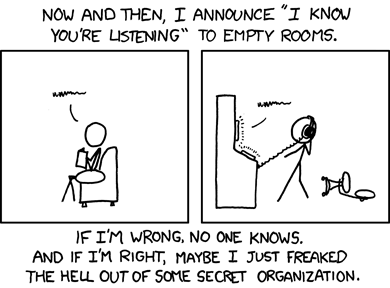Set in 1984, a date that is horribly easy for us both to remember, it is the story of a hardline Stasi officer who is allocated to listen in on an artistic couple - a writer and an actress. Previously a dedicated socialist willing to use any and all interrogation techniques against those that he saw an enemies of the state, he slowly realises that his surveillance operation is motivated by factors other than the security of the state. This erosion of his faith in the state that he has served with such dedication allows him to see that the couple are humans, too, deserving of sympathy. I won't explain any further - go and watch it. Amazon's price is ridiculously low for what you get.
As I watched, the degree of intrusion into the private lives of citizens was frightening. Initially, I consoled myself with the thought that "it couldn't happen here". That worked, until I realised that the option they discussed of leaving the dissident alone in a cell for 40 days was indistinguishable from what we do to those in Belmarsh. Then, like the Stasi officer, I began to notice more. The 40 hour interrogation that eventually breaks down the enemy of the state, for example - not allowed by PACE, but permissible in terrorist cases where there is an urgent need. And who defines terrorism or urgency?
I started watching closely, trying to find a measure used by the Stasi in the film that would not be possible here. Granted, all of the measures were used by the on a greater scale and with much (much) less provocation, but those were issues of degree not principle. I wanted, I needed to see some point of principle on which the UK in 2009 differed from the East Germany of 1984, as depicted. At last, I found something; the senior Stasi officer referred to the registration of typewriters - a measure to allow forensic evidence of a typeface to be used to identify the author of a suspect work. We do not, and have not, ever registered typewriters or other means of literary expression in this way. I was happy.
For a day or so. Then I remembered various recent posts on Letters From A Tory on the subject of regulation of the Internet, such as this one, and this one. Few of us use typewriters these days - we use the Internet. So the equivalent of registering typewriters is to begin to regulate the Internet, control what is available, set restrictions on what can be read. Restrictions such as LFAT discussed, or the (albeit temporary) recent banning of a perfectly legal page on Wikipedia. Or the introduction of a database to track our use of the Internet and telephone, for the exact same reason as the registration of East German typewriters.
Thanks, New Labour. If anyone worried that they were not really socialist, they can relax now. They are indeed socialist, to an extent that is (to me) indistinguishable from Erich Honecker.
There is one cheerful note to this post. The morning after I finished watching, xkcd posted this cartoon. Spooky.....

I'm sure that in most cases "they" are not listening. "They" don't have the manpower or the organisation, apart from anything else. But the government does seem to be putting in place the legal framework whereby a later, less "benign" authority could come in and run riot.
ReplyDeleteWhatever happened to due process?
I found the Lives of Others deeply chilling too, for the same reasons. I was also horrified when I was helping My Girl sort her notes out for her History A level to be reminded how Hitler started out as a figure of fun and derision, but rapidly gained popularity, partly because the economy was in such dire straits.
ReplyDeleteLilith..Bit like George Galloway.
ReplyDeleteA friend of mine, who is normally fare more pro state than me had a similar revelation watching V for Vendetta over Christmas. Not a heavy weight film I know but it served a purpose. I will have to get a copy of The lives of others.
ReplyDeleteJoseph K.